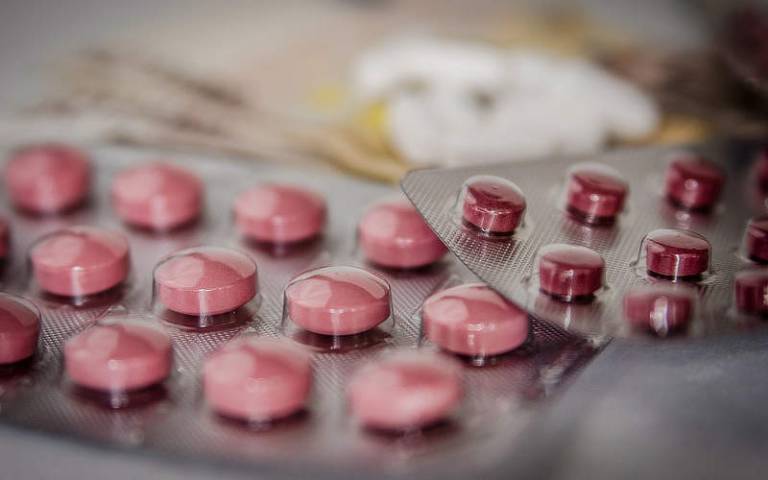Antiviral drugs trialled in the early stages of COVID-19
28 October 2020
Two antiviral drugs are being given to COVID-19 positive adults to establish if they stop the virus replicating, as part of a trial led by UCL scientists.

The FLARE trial aims to see if favipiravir and lopinavir/ritonavir, alone or in combination, can inhibit viral replication in early infection - within the first few days of illness.
Recruitment is taking place across London of people who have tested positive for COVID-19 and are self-isolating at home, either asymptomatic or in the first few days of symptoms. Up to 240 adults aged 18 to 70 will be recruited to the randomised placebo controlled trial and participants will take oral medication (tablets) for seven days.
Trial lead, Dr David Lowe (Institute of Immunity & Transplantation and Royal Free Hospital), said: “This trial will test whether the anti-viral drugs favipiravir or lopinavir/ritonavir, on their own or in combination, can reduce the level of the virus in people with early COVID-19 disease.
“To maximise the potential benefit, we are treating patients with very early onset infection and are looking for the additional or synergistic effects of adding a second drug [favipiravir or lopinavir/ritonavir].
“If we can find antivirals that decrease viral load early on, this might reduce the risk of transmission and later hospitalisation.”
The two antiviral drugs
Favipiravir works in a similar way to remdesivir and is a polymerase inhibitor, which blocks the enzyme that allows the virus to replicate its nucleic acid coding strand. The drug is approved for treatment of influenza in Japan.
UCL researchers involved in the trial, Dr David Lowe, Professor Judith Breuer (UCL Infection & Immunity) and Professor Joe Standing (UCL GOS Institute of Child Health), have also used favipiravir to successfully treat serious viral infections in immunocompromised patients at Great Ormond Street Hospital and the Royal Free Hospital.
A research paper published in the Proceedings of the National Academy of Sciences this month, and co-authored by Professor Breuer, has also confirmed that favipiravir inhibits coronavirus in a hamster model of infection. This finding adds to the results of a small trial carried out in Japan, which found favipiravir given to COVID-19 patients with non-severe pneumonia shortened recovery time by 2-3 days.
Lopinavir/ritonavir is a protease inhibitor, which works by blocking an enzyme that processes proteins that the virus needs for growth. Lopinavir/ritonavir only has modest antiviral activity against SARS-CoV-2 and did not improve outcomes when given on its own to hospitalised patients with late-stage disease in the RECOVERY trial. FLARE is testing whether it is more effective in the early stages of COVID-19 and in combination with favipiravir.
The trial is funded by LifeArc and is led by UCL and run in partnership with the Royal Free Hospital, University College London Hospitals (UCLH) and Great Ormond Street Hospital NHS trusts
If this study is successful, researchers later plan to investigate this strategy of early antiviral treatment in high-risk patients to prevent serious outcomes from the disease including hospitalisation and death.
Links
- FLARE Trial
- Read the paper: 'Favipiravir at high doses has potent antiviral activity in SARS-CoV-2−infected hamsters, whereas hydroxychloroquine lacks activity' (PNAS)
- Profile: Professor David Lowe
- Profile: Professor Judith Breuer
- Profile: Professor Joe Standing
- UCL Institute of Immunity & Transplantation
- UCL GOS Institute of Child Health
- Royal Free Hospital
- UCLH
- Great Ormond Street Hospital NHS trusts
- LifeArc
- RECOVERY Trial
Image
- Credit: Jarmoluk via Pixabay
Further information
- Source: UCL News
- Media Contact: Henry Killworth, Tel: +44 7881 833274
 Close
Close

